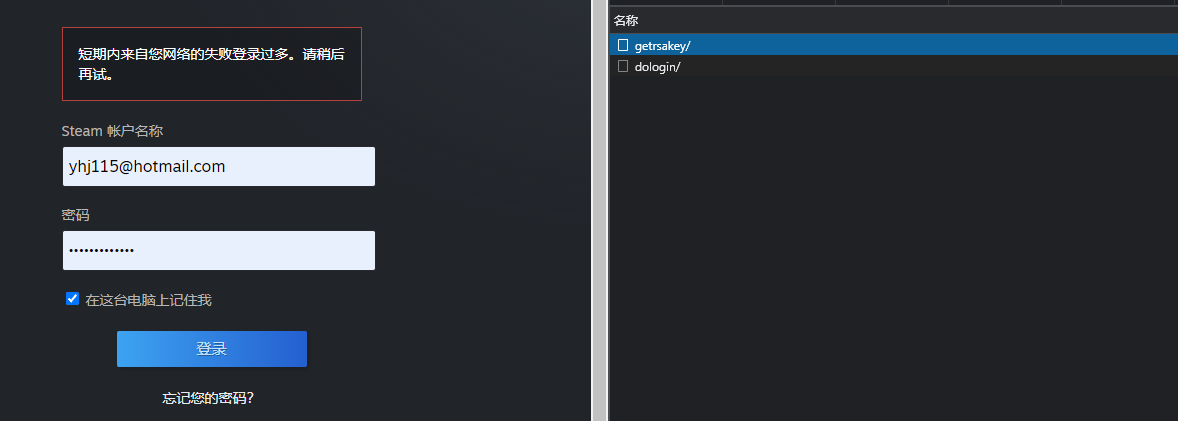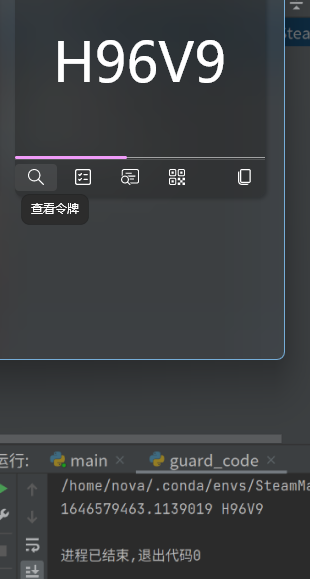Setting up a fully automatic STEAM trading bot front and back end
Aims
- Real-time monitoring of the sales proportion and demand proportion of items
- Automatic price adjustments (involving STEAM token generation, trade confirmation, etc.)
- Crawling for low percentage items
- Visual management of items
- Managing different accounts
- Relatively safe information storage/handling methods
- ...
Backend
Environment
Planning to use FASTAPI as the backend. Create an environment using Conda, and install FASTAPI
pip install fastapi[all]
Use uvicorn as the server for running the program
Start by setting up the basic framework
import uvicorn
from fastapi import FastAPI
app = FastAPI()
if __name__ == "__main__":
uvicorn.run("main:app", host="0.0.0.0", port=4345)
STEAM Related
Login
As a first version, I plan to use cookies directly for login operations, and may consider switching to username and password in future versions
To implement STEAM login, the relevant requests need to be captured.
Principle

- Received the account's
public_keythroughgetrsakey/, withdonotcacheandusernamefields in thepayload
Here, donotcache is the timestamp multiplied by 1000 and rounded, and username is the plaintext Steam account name
The returned JSON looks like
{
"success": true,
"publickey_mod": "deadbeef0deadbeef0deadbeef",
"publickey_exp": "010001",
"timestamp": "216071450000",
"token_gid": "deadbeef0deadbee"
}
Provided modulus and exponent, we need to generate our public key and encrypt the password
i.e.
- Use
dologin/to login with different payloads and validate2fa
The typical payload looks like
{
"donotcache": 1646663656289, // Same timestamp as above
"password": "base64_encoded_encrypted_password", // RSA public key encrypted binary data encoded in base64
"username": "username", // Username
"twofactorcode": "Guard_Code", // Mobile authenticator code
"emailauth": "", // Email verification code
"captchagid": 4210307962151791925, // CaptchaGID, retrieved from the value returned by `do_login/`, and fetch the Captcha image at `https://steamcommunity.com/login/rendercaptcha/?gid=%captchagid%`
"captcha_text": "th37yr", // Captcha text, if needed, must exist simultaneously with the item above
"rsatimestamp": 216071450000, // RSA expiration time, obtainable in `getrsakey/`
"remember_login": true // Save login information (although we don't need it)
}
The results are conveyed through different return values, for example:
{
"success": false,
"requires_twofactor": true,
"message": ""
}
{
"success": false,
"message": "Please enter the characters below to verify this is a human operation.",
"requires_twofactor": false,
"captcha_needed": true,
"captcha_gid": "4209182061243079173"
}
Implementation
Using aiohttp for interaction
import base64
import rsa
import time
from aiohttp import ClientSession
from typing import Dict
BASE_STEAM_URL = "https://steamcommunity.com"
GET_RSA_KEY_API_URL = "/login/getrsakey/"
DO_LOGIN_API_URL = "/login/dologin/"
LOGIN_URL = "/login?oauth_client_id=DEADBEEF&oauth_scope=read_profile%20write_profile%20read_client%20write_client"
class Response(Dict):
def __getattr__(self, item):
return self.get(item)
def __setattr__(self, key, value):
self.__setitem__(key, value)
async def do_login(username: str,
password: str,
twofactorcode: str = '',
emailauth: str = '',
captchagid: int = 0,
captcha_text: str = '',
headers: Dict = None,
cookies: Dict = None,
**kwargs) -> Response:
"""
login steam and return the Response
:param username: steam username
:param password: steam password, should be plaintext
:param twofactorcode: optional, steam guard code
:param emailauth: optional, steam email guard code
:param captchagid: optional, steam will tell it if needed
:param captcha_text: optional, captcha text, should be set together with captchagid
:param headers: optional, custom headers
:param cookies: optional, custom cookies
:param kwargs: optional, args for ClientSession
:return:
"""
if headers is None:
headers = {"X-Requested-With": "com.valvesoftware.android.steam.community",
"Referer": "https://steamcommunity.com/mobilelogin?oauth_client_id=DEADBEEF&oauth_scope=read_profile%20write_profile%20read_client%20write_client"}
if cookies is None:
cookies = {"mobileClientVersion": "0 (2.3.13)",
"mobileClient": "android",
"Steam_Language": "schinese"}
async with ClientSession(headers=headers, cookies=cookies, **kwargs) as session:
data = {
"donotcache": int(time.time()*1000),
"username": username
}
async with session.post(BASE_STEAM_URL + GET_RSA_KEY_API_URL, data=data) as resp:
if resp.status == 200 and (response := await resp.json()).get("success"):
response = Response(response)
modulus = int(response.publickey_mod, 16)
exponent = int(response.publickey_exp, 16)
rsa_timestamp = response.timestamp
else:
if resp.status == 200:
raise ConnectionError(f"Get RSA Key Error! [{resp.status}]: {response}")
else:
raise ConnectionError(f"Get RSA Key Error! Error Code: {resp.status}")
public_key = rsa.PublicKey(modulus, exponent)
en_password = password.encode(encoding='UTF-8')
en_password = rsa.encrypt(en_password, public_key)
en_password = base64.b64encode(en_password)
data = {
"donotcache": int(time.time() * 1000),
"username": username,
"password": en_password.decode('UTF-8'),
"twofactorcode": twofactorcode,
"emailauth": emailauth,
"rsatimestamp": rsa_timestamp,
"remember_login": True
}
if captchagid and captcha_text:
data["captchagid"] = captchagid
data["captcha_text"] = captcha_text
async with session.post(BASE_STEAM_URL + DO_LOGIN_API_URL, data=data) as resp:
if resp.status == 200:
response = Response(await resp.json())
if response.success:
response.cookie = resp.cookies.output()
response.cookie_object = resp.cookies
return response
else:
raise ConnectionError(f"Login Error! Error Code: {resp.status}")
Not much to elaborate, just created a Response class to save some time.
It's worth noting that when logging in successfully, I pass in a cookie and a cookie_object (Simplecookie object) as it will be useful for subsequent uses.
TODO: raising a
ConnectionError, may create custom exceptions later on.
Token
Before implementing token generation, let's first understand the principle behind it
Principle
Firstly, it's important to recognize that STEAM token generation algorithm is a form of Time-based One-time Password (TOTP) algorithm
Based on the RFC-6238 standard STEAM utilizes, in the implementation process of this algorithm, Client and Server need to negotiate a common Secret as a key—referred to as shared_secret in the token detailed data
At this point, according to the standard STEAM token generation technique utilized, the T0 (Unix Time) and T1 (30s) along with the current timestamp are used to calculate the message C (counter, i.e., how many T1s have passed since T0), and the key Secret is used as the key to calculate the HMAC value using the standard encryption algorithm SHA-1
Taking the lowest 4 significant bits of the HMAC as the byte offset and discarding them
After discarding these 4 bits, from the MSB of the byte offset, discard the most significant bit (to avoid it becoming a sign bit), and take 31 bits, the password is these as decimal numbers based on 10.
STEAM further adapts this by assigning CODE_CHARSET to the digits. The specific method is to divide the decimal number corresponding to the password by the length of CODE_CHARSET, where the remainder is the index to CODE_CHARSET, and the quotient continues the operation with the new decimal number until 5 numbers are obtained.
The
CODE_CHARSETand the algorithm mapping it are not found from reliable sources. It is speculated that it was obtained by decompiling the STEAM client or knowledgeable attempts.
Implementation
It is a sin to reinvent the wheel. In the spirit of using more libraries since it is for personal use, I chose the pyotp library as a one-click TOTP generation tool.
However, it failed. For unknown reasons, the base32 secret generated incorrectly.
Having gained a thorough understanding of the implementation principle, I decided to implement this algorithm manually once, abstaining from using ready-made libraries to simplify the project.
import hmac
import hashlib
import time
import base64
def gen_guard_code(shared_secret: str) -> str:
"""
Generate the Guard Code using `shared_secret`
:param shared_secret: shared_secret, should be a base64-encoded string
:return: the guard code
"""
shared_secret = shared_secret.encode('UTF-8')
b64_decoded_shared_secret = base64.b64decode(shared_secret)
time_bytes = (int(time.time()) // 30).to_bytes(8, byteorder='big') # Turn time_stamp into a 64 bit unsigned int
hmac_code = hmac.new(b64_decoded_shared_secret, time_bytes, hashlib.sha1).digest() # Generate HMAC code
byte_offset = hmac_code[-1] & 0xf # Get last 4 bits as bytes offset
code_int = (
(hmac_code[byte_offset] & 0x7f) << 24 | # Drop off the first bit (MSB)
(hmac_code[byte_offset+1] & 0xff) << 16 |
(hmac_code[byte_offset+2] & 0xff) << 8 |
(hmac_code[byte_offset+3] & 0xff)
)
CODE_CHARSET = [50, 51, 52, 53, 54, 55, 56, 57, 66, 67, 68, 70, 71,
72, 74, 75, 77, 78, 80, 81, 82, 84, 86, 87, 88, 89]
codes = ''
for _ in range(5):
code_int, i = divmod(code_int, len(CODE_CHARSET))
codes += chr(CODE_CHARSET[i])
return codes

Trade Confirmation
Trading is perhaps one of the most complicated aspects related to STEAM. It requires identity_secret and device_id as parameters.
Confirmation List
Through packet sniffing on the mobile end, the confirmation page's API_URL is https://steamcommunity.com/mobileconf/conf?%payload%
First, let's implement fetch_confirmation_query_params, i.e., to fetch the confirmation list
Required parameters are
| Param | Description |
|---|---|
| p | device_id |
| a | steam_id |
| t | Timestamp |
| m | Device (Android/IOS) |
| tag | Tag, unique value conf (to be confirmed) |
| k | timehash, generated by time_stamp and tag as parameters, encoded in base64 HMAC using identity_secret as the key |
Initially, generate timehash
import base64
import hashlib
import hmac
import time
def gen_confirmation_key(times: int, identity_secret: str, tag: str = 'conf') -> str:
"""
Generate the secret for confirmation to check.
:param times: time_stamp, should be int instead of float
:param identity_secret:
:param tag: 'conf', 'allow', 'cancel', 'details%id%'
:return: base64-encoded secret, which is not urlencoded.
"""
msg = times.to_bytes(8, byteorder='big') + tag.encode('UTF-8')
key = base64.b64decode(identity_secret.encode('UTF-8'))
secret = hmac.new(key, msg, hashlib.sha1).digest()
return base64.b64encode(secret).decode('UTF-8')
Next, write the request call, as the confirmation page seemingly doesn't have a front and back end separation; hence, crawling for the confirmation list is the only approach.
from aiohttp import ClientSession
from urllib.parse import urlencode, quote_plus
from typing import Union, Dict, List
from http.cookies import SimpleCookie
BASE_STEAM_URL = "https://steamcommunity.com"
MOBILECONF_URL = "/mobileconf/conf"
async def fetch_confirmation_query(cookies: Union[Dict, SimpleCookie],
steam_id: str,
identity_secret: str,
device_id: str,
tag: str = "conf",
m: str = "android",
headers: Dict = None) -> Dict[str, Union[str, List[Dict]]]:
"""
fetch confirmation query as a list of json dict.
:param cookies: Cookies contains login information
:param steam_id: 64bit steamid
:param identity_secret:
:param device_id:
:param tag: 'conf'
:param m: 'android', 'ios'
:param headers:
:return: Response of confirmation query.
"""
if headers is None:
headers = {
"X-Requested-With": "com.valvesoftware.android.steam.community",
"Accept-Language": "zh-CN,zh;q=0.9"
}
times = int(time.time())
query = {
"p": device_id,
"a": steam_id,
"k": gen_confirmation_key(times, identity_secret, tag),
"t": times,
"m": m,
"tag": tag
}
async with ClientSession(headers=headers, cookies=cookies) as session:
print(BASE_STEAM_URL + MOBILECONF_URL + '?' + urlencode(query))
print(urlencode(query, safe=":"), type(urlencode(query)))
async with session.get(BASE_STEAM_URL + MOBILECONF_URL + '?' + urlencode(query)) as resp:
if resp.status == 200:
# do something
pass
else:
raise ConnectionError(f"Fetch Confirmation Error! Error Code: {resp.status}")
Based on my usual practices, I opted for beautifulsoup4 as the extractor and lxml as the parser
from bs4 import BeautifulSoup
def steam_confirmation_parser(html: str):
soup = BeautifulSoup(html, 'lxml')
confirmations = soup.find_all("div", class_="mobileconf_list_entry")
if len(confirmations):
data_list = []
for confirmation in confirmations:
data = {
"type": confirmation.get('data-type'),
"confid": confirmation.get('data-confid'),
"key": confirmation.get('data-key'),
"creator": confirmation.get('data-creator'),
"accept_text": confirmation.get('data-accept'),
"cancel_text": confirmation.get('data-cancel'),
"img": confirmation.find('img')['src'],
"desc": "\n".join(confirmation.stripped_strings)
}
data_list.append(data)
return {
"success": True,
"data": data_list
}
return {
"success": soup.find('div', id="mobileconf_empty"),
"data": ["\n".join(soup.find('div', id="mobileconf_empty").stripped_strings)]
if soup.find('div', id="mobileconf_empty") else ["Invalid Html\nIt is not a parsable html."]
}
Sending Requests
Having established the above foundation, sending requests becomes straightforward.
The url is https://steamcommunity.com/mobileconf/ajaxop?%payload%
The payload parameters are as follows
| Param | Description |
|---|---|
| p | device_id |
| a | steam_id |
| t | Timestamp |
| m | Device (Android/IOS) |
| op | Action, either cancel or allow |
| k | timehash, generated from time_stamp and op as parameters, encoded in base64 HMAC using identity_secret as the key |
| cid | data-confid, provided in <div> tag with class mobileconf_list_entry |
| ck | data-key, provided in <div> tag with class mobileconf_list_entry |
AJAX_POST_URL = "/mobileconf/ajaxop"
async def send_confirmation_ajax(cookies: Union[Dict, SimpleCookie],
steam_id: str,
identity_secret: str,
device_id: str,
cid: str,
ck: str,
op: str = "allow",
m: str = "android",
headers: Dict = None) -> bool:
"""
Send AJax post to allow/cancel a confirmation
:param cookies: Cookies contains login information
:param steam_id: 64```python
def fetch_confirmation_details(cookies: Dict, steam_id: str, identity_secret: str, device_id: str, cid: str, m: str = "android", headers: Dict = None) -> Dict[str, str]:
"""
Fetch a confirmation's details
:param cookies: Cookies contains login information
:param steam_id: 64bit steamid
:param identity_secret:
:param device_id:
:param cid: data-confid
:param m: 'android', 'ios'
:param headers:
:return: The Response
"""
if headers is None:
headers = {
"X-Requested-With": "com.valvesoftware.android.steam.community",
"Accept-Language": "zh-CN,zh;q=0.9"
}
times = int(time.time())
tag = "details" + cid
query = {
"tag": tag,
"p": device_id,
"a": steam_id,
"k": gen_confirmation_key(times, identity_secret, tag),
"t": times,
"m": m,
}
async with ClientSession(headers=headers, cookies=cookies) as session:
async with session.get(BASE_STEAM_URL + DETAIL_URL + cid + '?' + urlencode(query)) as resp:
if resp.status == 200:
return await resp.json()
else:
raise ConnectionError(f"Fetch Confirmation Details Error! Error Code: {resp.status}")
This Content is generated by LLM and might be wrong / incomplete, refer to Chinese version if you find something wrong.